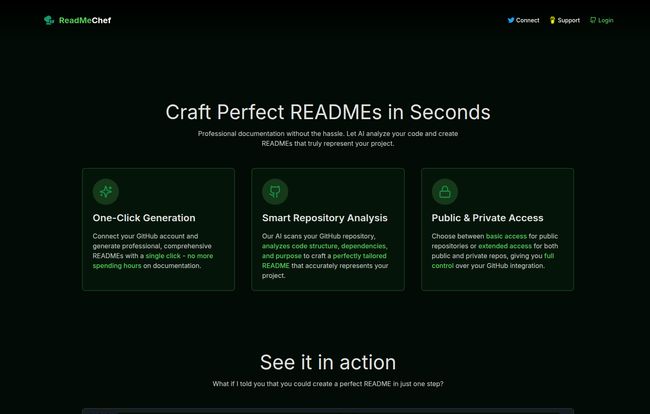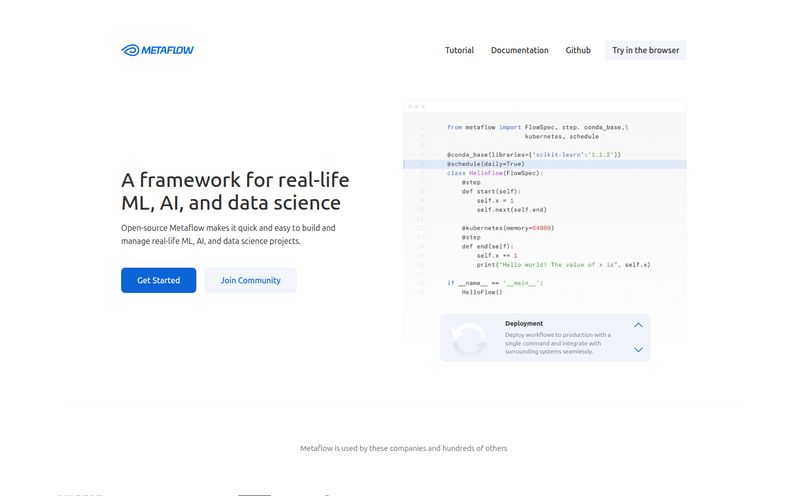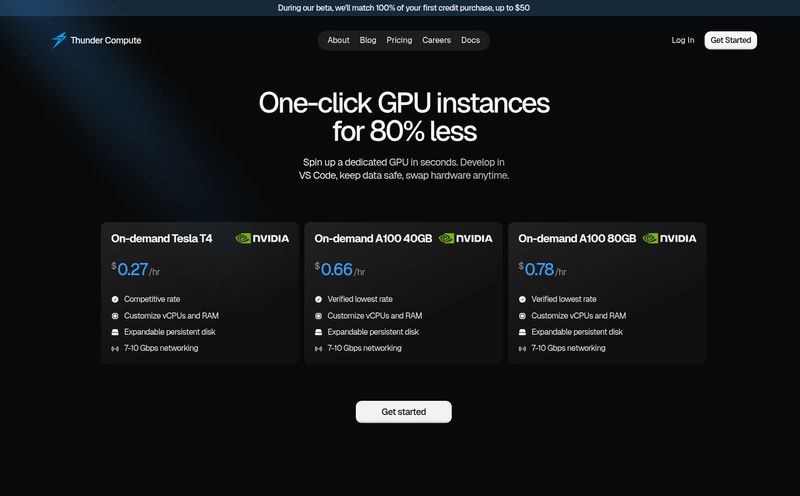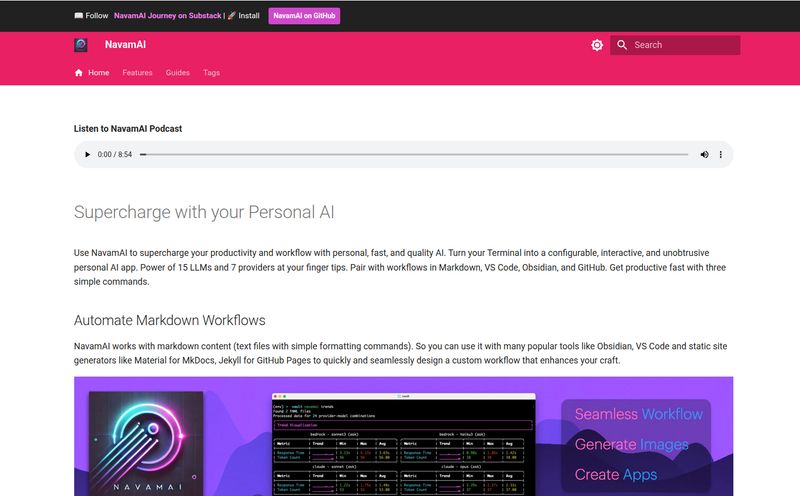Writing documentation is the part of coding we all love to hate. It’s like being forced to eat your vegetables after you’ve already had dessert. You’ve just built this beautiful, intricate piece of software—a work of art, really—and the very last thing your brain wants to do is switch gears and write a manual for it. The result? A two-line README that just says 'run npm install && npm start'. We’ve all been there.
I’ve seen some truly tragic READMEs in my time. Some that were so vague, they felt like riddles. Others so outdated, the installation instructions were for a version of Node.js that’s now a fossil. This isn't just a pet peeve; it's a project killer. A bad README is a giant, flashing “GO AWAY” sign on your repository’s front door.
So, when I stumbled upon a tool called ReadmeChef, my curiosity was piqued. An AI that promises to “cook up” a professional README in seconds? It sounded too good to be true. Like a kitchen gadget that promises to chop, dice, and julienne with one pull of a string. I was skeptical, but as someone who’s spent way too many late nights wrestling with Markdown, I had to give it a shot.
So What Exactly is ReadmeChef?
Think of ReadmeChef as your personal sous-chef for project documentation. It’s an AI-powered tool designed to do one thing and do it well: generate a professional, comprehensive README.md file for your project instantly. You don’t write the content from scratch. Instead, you connect your GitHub or GitLab account, pick a repository (it works with public and private repos, which is a huge plus), and with a single click, it analyzes your code and serves up a fully-formed README.
It’s not just filling in a generic template. The tool claims its “Smart Repository Analysis” peeks into your codebase to understand what’s going on—what frameworks you’re using, what the main files are, etc.—to create a document that’s actually relevant. A pretty bold claim.

Visit ReadmeChef
Why Your Project is Begging for a Better README
Before we get into whether the tool actually works, let’s talk about why this even matters. For years, I’ve been telling junior devs that a good README is non-negotiable. It’s not just documentation; it’s marketing, onboarding, and community-building all rolled into one ugly-ish text file.
The folks at ReadmeChef seem to get this, and they’ve put some compelling numbers on their site that echo what many of us in the field have known intuitively for years.
It’s Your Project’s Welcome Mat and Billboard
A project with a clear, well-documented README is just more trustworthy. According to data from a GitHub survey, 52% of developers have decided not to use a project specifically because of incomplete or confusing docs. That’s half your potential users gone before they even clone the repo. On the flip side, projects with quality documentation are 50% more likely to be recommended by GitHub, which directly boosts traffic and discoverability. It’s the difference between a project that looks alive and one that feels abandoned.
Attracting Help Without Begging
If you're running an open-source project, a good README is your number one recruitment tool. Another gem from GitHub's research shows that projects with comprehensive READMEs attract a staggering 125% more external contributions. Think about it: a potential contributor is much more likely to jump in if they can understand the project's purpose, setup, and contribution guidelines in five minutes, rather than having to piece it all together themselves.
The Ultimate FAQ That Reduces Your Workload
Here’s my favorite part. A solid README drastically cuts down on repetitive questions. It’s the first line of defense against a flood of “How do I run this?” issues. In fact, the Stack Overflow Developer Survey has shown that good documentation can slash developer onboarding time by as much as 80%. That’s less time you spend hand-holding and more time you spend coding. A win-win for everyone.
My Honest Take: Cooking with ReadmeChef
Alright, so I connected my GitHub and threw a few of my old, neglected side-projects at it. One was a simple Express.js API, another a slightly more complex React app. Here’s the unfiltered breakdown of my experience.
The Delicious Parts (What I Liked)
The sheer speed is, without a doubt, the main selling point. It literally took seconds to go from a blank slate to a structured document. For a developer, time is our most precious resource, and this tool saves a ton of it. It’s the perfect antidote to “documentation procrastination.” It gets you from 0 to 80% in the blink of an eye, and that initial momentum is often all you need.
The generated structure was also surprisingly good. It created logical sections for Features, Prerequisites, Installation, and Usage. It correctly identified the package manager (npm) and pulled in the project name and a brief description. It’s more than a template; it's a genuinely useful, pre-populated starting point that helps build immediate trust with anyone who stumbles upon your project and eases future maintenance. It's a solid foundation to build upon.
Needs a Little More Seasoning (The Imperfections)
Now, let's be real. An AI can't read your mind. While the structure was great, the AI-generated descriptions were a bit... generic. For my React app, it gave a basic overview of what a React app does, not what my specific app does. This isn’t a flaw in the tool itself, so much as a limitation of the current state of AI. It can analyze your `package.json`, but it can't understand the why behind your project.
So, you absolutely have to go in and tweak it. You’ll need to rewrite the main description, add more detail to the features list, and include any specific environment variables or gotchas. It’s not a one-click-and-publish solution. Think of ReadmeChef as the tool that lays out all your ingredients, neatly chopped and measured. You still have to be the chef who combines them, adds the secret spices, and plates the final dish.
What's the Damage? The Pricing
This is often the dealbreaker for new tools, right? Well, for now, it seems ReadmeChef is completely free to get started. The big, green "Get Started for Free" button on their homepage suggests you can just jump in without pulling out your credit card. I couldn't find a dedicated pricing page, so it's possible they'll introduce paid plans for teams or advanced features down the line. But for now, for the solo dev or small team, the price is unbeatable. Free.
Who Is This Tool Really For?
In my opinion, ReadmeChef is an absolute game-changer for a few groups of people:
- Solo Devs & Side Hustlers: When you're a one-person show, documentation is the first thing to get dropped. This ensures your projects look professional from day one.
- Students & New Developers: It’s a great way to learn what a good README should even look like and build good habits early on.
- Open-Source Maintainers: Use it to quickly standardize documentation across all your repositories and make them more welcoming to new contributors.
If you're a massive corporation with a dedicated technical writing team and a 100-page documentation style guide, this might be a bit too simple for you. But even then, it could be a handy tool for whipping up initial drafts for internal tools and microservices.
Ultimately, ReadmeChef doesn't replace the need for thoughtful documentation. It just removes the single biggest barrier to getting it done: starting. It turns the daunting, blank page of a `README.md` into a fill-in-the-blanks exercise. And for that, it’s earned a permanent spot in my developer toolkit. It won’t make you a Michelin-star chef overnight, but it sure makes getting a decent meal on the table a whole lot easier.
Frequently Asked Questions
What is ReadmeChef in simple terms?
ReadmeChef is an AI tool that automatically generates a professional README.md file for your software projects. You connect it to your GitHub or GitLab repository, and it analyzes your code to create a structured and detailed README for you.
Is ReadmeChef free to use?
Yes, at the time of writing, ReadmeChef is free to get started with. There is no public pricing information, which makes it very accessible for individual developers and small projects.
Can I use ReadmeChef with my private repositories?
Absolutely. ReadmeChef supports both public and private repositories on GitHub and GitLab, so you can generate documentation for your proprietary projects as well.
Which code platforms does ReadmeChef support?
Currently, ReadmeChef integrates directly with GitHub and GitLab, two of the most popular platforms for code hosting.
Is the generated README perfect right away?
It's a fantastic starting point, but not a final product. The AI creates a great structure and pulls in technical details, but you'll need to add the project-specific context, purpose, and nuance yourself. Always review and edit the generated content before publishing.
How does a good README actually help my project?
A good README boosts your project's visibility on platforms like GitHub, attracts more contributors to open-source projects, builds trust with potential users, and reduces the time it takes for new developers to get started.



